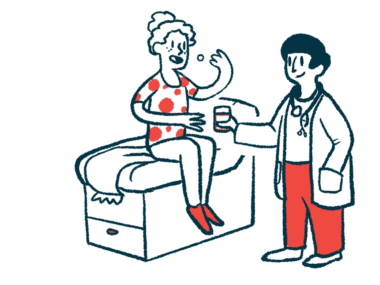Melatonin Supplements May Worsen MG Symptoms, Case Series Suggests
Written by |

Shutterstock
Melatonin supplements usually used to treat insomnia may aggravate the symptoms of myasthenia gravis (MG), possibly by activating the immune system or by interacting with other medications used to treat the disorder.
That is the conclusion of a study describing three cases of MG patients whose symptoms worsened within days or weeks of starting melatonin treatment.
The case series study, “Myasthenia gravis exacerbation after melatonin administration: case series from a tertiary referral centre,” was published in the journal BMC Neurology.
Melatonin is a hormone normally released from the pineal gland within the brain. It is an effective treatment for insomnia, as it is naturally involved in regulating the sleep-wake cycle.
Growing evidence also suggests that melatonin plays a role in immune system balance, with several studies reporting that supplements containing the hormone can worsen the symptoms of several autoimmune disorders. This appears to have occurred in three MG patients treated at the Bellvitge University Hospital, in Barcelona, Spain, between 2014 and 2019.
The first patient was a 49-year-old woman with generalized MG, who tested negative for antibodies against acetylcholine receptors (AChR) and muscle-specific kinase (MuSK), the two types of antibodies that usually cause the disease.
Her treatment consisted of a combination regimen of the glucocorticoid prednisone, administered at a dose of 10 mg every 48 hours, and mycophenolic acid, given at a dose of 360 mg every 12 hours. With this treatment regimen, she had remained asymptomatic for more than a year.
A few weeks before seeking hospital treatment, she began taking over-the-counter melatonin for persistent insomnia. She began experiencing double vision, a hoarse voice, and generalized tiredness, with no obvious trigger for those symptoms. Doctors suspected melatonin supplements were to blame due to the treatment timing and the onset of her symptoms, and she was advised to stop taking them.
Seeing little improvement in the first week off melatonin, her prednisone was increased to 50 mg/day, after which she progressively improved. The patient returned to her pre-hospital status five weeks later.
An 87-year-old man was the second patient studied. He also had generalized MG, but had tested positive for anti-AChR antibodies.
Previous surgery to remove a tumor from his larynx has resulted in residual difficulties swallowing. His MG symptoms had remained stable for six months, on a regimen of prednisone (15 mg every 48 hours). Irritability caused by this dose led to a change to 10 mg every 48 hours. Even after this dose change, his symptoms remained stable for another six weeks.
However, two days before being treated at the hospital, he began taking 1.9 mg of melatonin each night, because he was having difficulties falling asleep. He sought treatment for drooping eyelids during the day, and increased difficulty swallowing without evidence of cancer recurrence.
His symptoms stabilized but did not improve after his prednisone dosage was returned to its earlier level, and he was given pyridostigmine to take as needed. Although he was advised to stop taking melatonin, the patient preferred to continue taking it for his insomnia.
The third patient treated at the hospital was a 35-year-old man with generalized MG, who also tested positive for anti-AChR antibodies.
His MG symptoms were controlled for over a year with a combination of pyridostigmine (60 mg every four hours), mycophenolic acid (540 mg/day in two divided doses), and prednisone (15 mg every 48 hours).
After experiencing insomnia for six months, he tried taking doxylamine, an antihistamine used for its drowsiness effect. Although this did not affect his MG symptoms, it also failed to address his insomnia. One month later, he switched to an over-the-counter supplement containing 1.95 mg of melatonin, which he took once per day.
He was treated at the hospital one week later, complaining of progressively worsening MG symptoms. A neurological exam showed weakness in his facial muscles and those surrounding the elbow, difficulty chewing, and susceptibility to fatigue.
In the absence of any other identifiable trigger to these symptoms, he was taken off melatonin. However, his symptoms failed to improve over the next few days, leading doctors to increase his prednisone dosage to 30 mg daily.
Still, the patient’s condition — as measured by the Activities of Daily Living score — remained impaired over the following month. This prompted physicians to give him intravenous immunoglobulins at a daily dose of 0.4 g/kg for five days.
The patient experienced a strong clinical improvement two weeks after starting this treatment and returned to his pre-visit status one month later.
Although melatonin has previously been associated with the worsening of other autoimmune disorders, such as Crohn’s disease and rheumatoid arthritis, this appears to be the first time such an effect has been described in MG patients being treated with immunosuppressants.
Why this should occur remains unknown, although the investigators describing these cases suggest that melatonin might increase the body’s adaptive immune response and interact with other medications.
“We consider that melatonin should be administered with caution in patients with MG,” they wrote, “especially those who are being treated with immunosuppressants.”



Leave a comment
Fill in the required fields to post. Your email address will not be published.